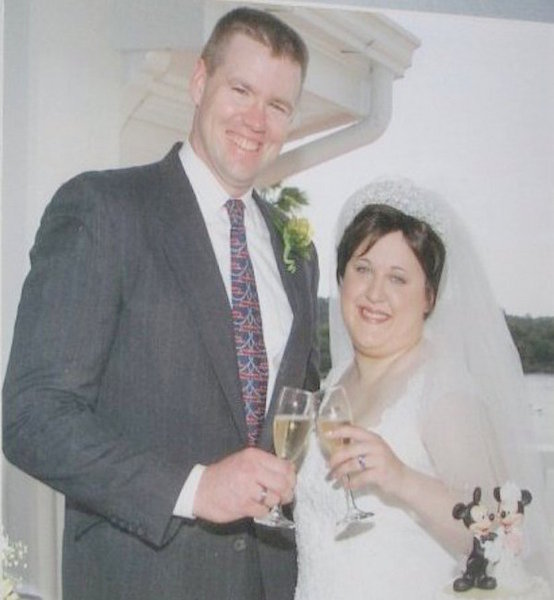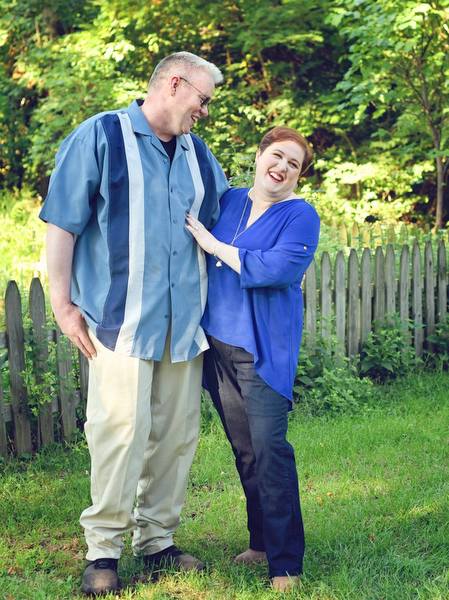My daughter’s christening was a monumental debut for both of us. She was being introduced as the newest member of our family, and I was coming out as her newly blind mother. After surviving the ceremony unscathed, my husband and I proudly carried our precious bundle into the celebration venue and handed her over to her godparents while we assumed our roles as hosts. He went one way and I went the other, bouncing from table to table knowing that if we finished quickly, we might actually get to enjoy the hot meal we were paying for.
For the most part, everyone I spoke with greeted me with a barrage of compliments. You look great. The baby is gorgeous. The food is fantastic. Occasionally, a guest would inquire how I was holding up since becoming legally blind a little over a year prior. It was nothing I couldn’t handle. I’d been mentally preparing for the inquisition for weeks. Just as I’d finished schmoozing my last table, an elderly relative grabbed me by the hand on her way back from the restroom. I politely answered her questions about my current medical status postpartum. I could, however, feel myself becoming increasingly irritated by her lack of sensitivity on the subject. Thankfully the conversation was interrupted by my infant daughter’s cries. As I moved towards the sound of my baby, the woman leaned in and whispered, “You must be so grateful to your husband for staying with you after going blind.”
Hearing her words made me wonder: Did she secretly represent the consensus of our guests? Had I misconstrued her elderly honesty? Grateful? Was I supposed to be grateful to my husband not leaving me after I lost my vision? On a day when I was supposed to be joyously celebrating all the things a person should be grateful for, I was suddenly distracted by three distinct reasons for why I was absolutely not grateful for having a husband who stayed.
1. We took vows.
Call me naive, but in a not-so-distant past, two eternally optimistic young people decided to get married. We took vows. In good times and bad, in sickness and in health. Sure, no one knew on our wedding day that we would have to face the long and arduous journey of me losing my eyesight. No one has a crystal ball into the future. But when you sign on to be someone’s partner for life, you need to be ready to greet the unknown. It’s definitely easier to cut your losses and run, but if the shoe had been on the other foot, I know I’d still be here. The person I pledged my life to understands the gravity of the words “till death us do part.” I’m not grateful for having a husband who stayed; we took the same vows.
2. We’re still us.
Losing my vision didn’t cause me to lose sight of the person I am. At my core, I remain the same woman my husband fell in love with. On the day my world became permanently blurred, nothing was more painful than not being able to clearly see his face. Because that’s the face I look to for comfort when I’m afraid, and I was terrified. We both were.
My husband was my rock during those first difficult days, as he always had been. We made decisions about my treatment and rehabilitation together. My husband is my cheerleader, not my caretaker. Yes, our relationship has been uniquely tested, but the foundation it has been built upon can withstand anything. I’m not grateful for having a husband who stayed; my disability hasn’t changed “us.”
3. We’re role models for our daughter.
There is something special about the relationship between a father and his daughter. Our little girl has had her daddy wrapped around her finger since the moment he laid eyes on her. My husband knows we’re the role models she will look towards when choosing a partner for her life. He takes that responsibility seriously. We both want our daughter to understand any relationship worth having involves effort and commitment between two people. Having a disability doesn’t change that. She will witness the peaks and valleys of our lives, but will become stronger knowing her parents could overcome anything together. Her daddy is special, not because he stayed with her mommy, but because he illuminates unconditional love for everyone he cares about. I’m not grateful for having a husband who stayed; we are equally responsible for being relationship role models for our daughter.
So here’s what I am grateful for: I’m grateful I chose to marry a man who’s in it for the long haul and meant the vows he said when he married me. I’m grateful for a husband who loves all of me, not just parts, but all. I’m grateful I chose a man who’s a good role model to his daughter. Hopefully, she will look for a partner in life who possesses the huge heart and strength of character of her daddy. I’m grateful for a husband who has never, not once, doubted my ability to be a good mother to our child despite being blind. I’m grateful for a man who’s intelligent enough to know my disability doesn’t define the woman I am.
Staying with the person you love if they become disabled shouldn’t require gratitude. The important parts of a person don’t change; what’s in their heart remains the same. My husband is not a martyr. He’s not a saint. He’s simply a man who honored his commitment to our relationship. He doesn’t need nor would he want my gratitude for staying, but he will always have my utmost respect for being the kind of man he is. Blind or not, I know we will never lose sight of our love for one another.


